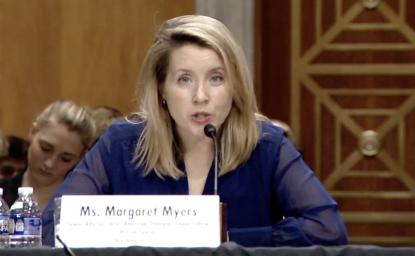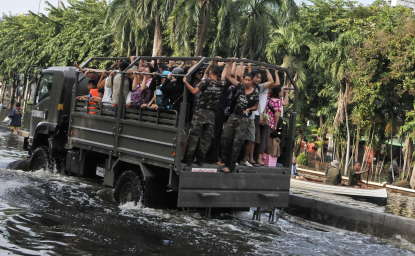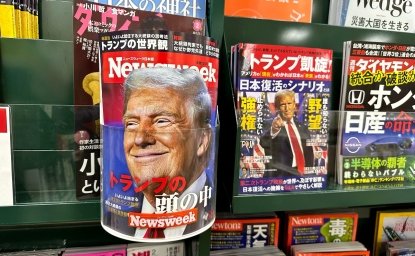This op-ed was printed in the August 8, 2002 issue of The Hindu.
It is probably advisable for the American Government to hold an official inquiry into fund-raising in the U.S. by groups implicated in the Gujarat violence.
TERRORISM COMES in many guises. An armed assault against Parliament House in New Delhi. A suicide bomber detonating high explosives in a crowded bazaar. Political assassination. Angry young men flying commercial aircraft into the World Trade Center. And, yes, hate-consumed mobs butchering innocent women and children.
The people of India need no instruction from foreigners regarding the moral issues raised by this spring's communal violence in Gujarat. Except for an embittered but fortunately minuscule minority, Indians of all religions and beliefs reacted with horror and disgust to the great human tragedy that unfolded in their country earlier this year.
All those who admire Indian culture and accomplishments, who celebrate the extraordinary progress India has achieved in its still brief national existence, understand that the tragedy of Gujarat strikes at the very essence of India's being and promise. The assassination earlier this year of Abdul Gani Lone, who opposed Indian rule in Kashmir but who in his final years had come to the realisation that violence and extremism offer Kashmiris no way out in their struggle with New Delhi, represented another blow to the ideals of tolerance and moderation, another triumph for the forces of hatred and sectarian-based violence. In this sense, the tragedies of Gujarat and of Kashmir are inextricably linked.
Kashmir was certainly not the cause of Gujarat. Sadly, the seeds of Godhra and Ahmedabad and Baroda spring from still more ancient soils. But the continued violence in Kashmir makes the hatred recently seen in Gujarat more likely, and in a perverted sense, more "respectable", or at least acceptable. Perhaps, it does not go too far to assert that until the Kashmir sore is at last healed, the poison that produced Gujarat will make other Gujarats increasingly likely.
Some Indians, of course, say that the tragic events in Gujarat are a domestic Indian affair, and that the United States and the rest of the world have no business intruding into a purely internal Indian matter. This is a self-serving falsehood. Important American interests, including the global war against terrorism, can be directly impacted by what the U.S. says — and fails to say — about Gujarat.
At this particular moment in history, the U.S. cannot allow the impression to take hold that Americans somehow value a Muslim life less than the life of a person of another religion. Sadly, there are those in the Islamic world who assert that the present conflict is a war directed not against terrorism, but against Islam. That the U.S. does not care about Muslims. That Washington seeks to hijack the tragedies of 9/11 to carry out long-held plans to repress the Islamic world. These are detestable lies, but many in the Muslim world are prepared to believe them. So leaving aside the moral issue, it is essential that India's friends in the U.S. speak out to condemn the injustice and hatred so prominently displayed in Gujarat, and to lend support to those Indians, of all religious beliefs, who are working to strengthen the forces of secularism, tolerance and multiculturalism.
Some have asked what impact the recent events in Gujarat will have — should have — on the new and healthier relationship that the U.S. is developing with India. No one needs to be reminded of the tortured history of U.S.-India relations over the years, or the difficulty the two nations have had in working collaboratively with one another, even on those issues where our purposes and interests ran along parallel tracks.
Over the past half dozen or so years — and notwithstanding the temporary if traumatic jolt to the relationship administered by India's 1998 nuclear tests and the subsequent imposition of U.S. sanctions — Washington and New Delhi have begun to construct a qualitatively better relationship, so much so that the Prime Minister, Atal Behari Vajpayee, has come to describe the two countries as "natural allies", a phrase increasingly used by Americans as well.
Following the trauma Americans experienced on September 11, India was one of the first countries in the world to step forward with a pledge of unconditional and unambivalent support for the U.S. in its quest to bring to justice those responsible for the terror attacks in New York and Washington. The administration of George W. Bush, already keen to upgrade relations with Delhi, took notice. Prior to the February 27 Godhra attack that touched off the bloodshed in Gujarat, this new and more sanguine relationship between the U.S. and India was widely viewed by Americans as in the national interest. It remains so today; Gujarat has not changed this calculation.
And yet, it is neither possible nor practical simply to pretend that Gujarat did not happen. The violence in Gujarat, and the steps the Indian Government might take in coming months in response to those events, could have a significant impact on American views of India, and hence, on political and public support in the U.S. for a close and collaborative U.S.-India partnership.
Credible reports have recently suggested that substantial sums of money are sent from Indians resident in the U.S., and from American citizens of Indian origin, to groups and organisations in Gujarat and elsewhere in India that are directly linked to the violence in Gujarat. I do not know if these accounts are true. But respected Indian journalists have uncovered disturbing linkages. If these reports prove accurate, then it is possible that such financial transactions violate U.S. anti-terrorism statutes.
Alternatively, issues of fraud may be at issue. Responsible sources report that some U.S. residents make financial contributions to overseas religious groups in the belief that these funds are to be used for religious or humanitarian purposes, when in fact the monies so raised are used to promote religious bigotry.
In either event, it is probably advisable for the American Government to hold an official inquiry into fund-raising in the U.S. by groups implicated in the Gujarat violence, to ensure that U.S. laws are not being violated. Legitimate organisations need not fear such an investigation, which would serve to clear their names and reassure potential donors about the legitimacy of their fund-raising activities.
Nor would such an inquiry be new or unusual. The U.S. has acted in the past to regulate or even to ban fund-raising activities by groups advocating violence and ethnic or religious intolerance in other countries, as well as activities where fraud may be an issue. Since September 11, both the Bush administration and other Governments have shut down a number of groups whose ostensible purposes were to collect funds for Muslim charities, but which actually served to finance terrorist networks.
The Gujarat violence, Lone's assassination, and most recently, the designation of L.K. Advani as Deputy Prime Minister and most likely successor to Mr. Vajpayee have all raised new concerns about India's future among India's friends in the U.S. An official U.S. investigation into Gujarat-related fund-raising, voluntarily facilitated by the Government of India, would go far towards easing those concerns and further strengthening the new partnership between our two peoples.
--------------------------------------------------------------------------------
Others wishing to enter this debate may do so by emailing their comments to asia@wwic.si.edu Selected responses that help promote serious discussion of these issues will be posted on this website.
Responses to this article:
. . . Hathaway's article illustrates what the problem is. Instead of laying down general principles or specific American national interests, his advice concerning Washington's South Asia policy focuses on sectional demands whispered into his ear by a foreign lobby whose nature and motives he fails to comprehend. . . . Hathaway probably doesn't understand why the vast majority of the human race is fed up with American arrogance. . . . If Hathaway wants to thwart religious "charities" promoting both "religious bigotry" and "violence and religious and ethnic intolerance," he can start much closer to home. American Baptist and Evangelical groups are financing the propagation of Christian religious bigotry of the most obscurantist kind in India's Northeast and tribal belts. Much of this bigotry has resulted in armed separatism, terrorism and ethnic cleansing of tribes refusing to become Christians.
-------Koenraad Elst, Belgium
--------------------------------------------------------------------------------
There are many like me here in India who share your concerns particularly about the funding of blatantly communal and fundamentalist groups by some sections of the non-resident community. We saw in an earlier decade a similar phenomenon with the Khalistan movement. Unfortunately, parts of the NRI community are very susceptible to this kind of thing, perhaps because of their own need to express their identity. The results however for those of us who live in and love this country can be devastating.
---------Gita Sen, Bangalore
--------------------------------------------------------------------------------
You are truly a moran of exceptional heights. . . . Please be advised that the world is smarter than you think. Make sure you mature and grow as you get older. Keep your biased comments to yourself. From: "Not your puppet" Indian American.
PS: How much money did you collect from Islamic front for your anti-India propaganda?
--------------------------------------------------------------------------------
Have just read your piece in The Hindu, arguing why and how the US has a legitimate interest in finding out who funded the Gujarat pogrom. As an Indian, I did not feel offended by the prospect. You've probably gone to the heart of the matter, and I hope good sense will prevail in New Delhi. If only all international pressure from the US were as under-stated and polite as this one!
-------George Abraham, Trivandrum, Kerala
--------------------------------------------------------------------------------
There is a thin line of distinction between the US foreign policy objectives and the objectives of terrorist groups. --Who are the sponsors of terrorism? --Who supported the creation of terrorist groups to fight against? --Who supported KLA in its war against the Yugoslavia government? --Who is supporting Christians against their fight in Sudan? --Who created a coup against Chavez? --Who wages a war against left wing guerrilas in Colombia? --Who tries to unseat democratically elected unfriendly regimes in Central America? --Who is supporting the ruthless and tyranical regimes in the Middle East? I have always wondered about the academic credibility of western scholars on India. . . . the writtings of the western scholars have never been taken seriously by India, particularly Indian administrative community. . . . So let us not bother about what the Indian friends in US talk and agonise about India. India is capable of taking care of itself without Indian friends in the US. Let us not take your contribution to The Hindu seriously. Let Indian friends in the US talk about these issues seriously rather than becoming uneasy about Gujarat incident. Certainly it is an aberation in Indian politics. This is one among many. Is there not any retaliations against the muslims and muslim interests in the US after 9/11. Please do not give us a lecture. Indian are capable enough to take care of themselves. . . . Indian software community in the US is enough to take {care} of Indian interest in the US.
----Ananya Kalaivani, United Kingdom




